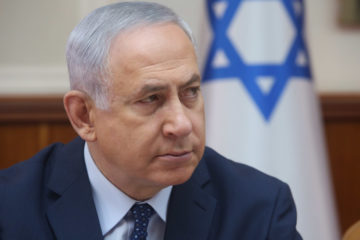Bloomberg Business: Netanyahu Pulls Back Campaign Opposition to Two-State Plan
©2015 Bloomberg News
NLHB1U6TTDS7
(Bloomberg) — Israeli Prime Minister Benjamin Netanyahu said he is still committed to Palestinian statehood if circumstances improve, pulling back from comments he made during his re-election campaign rejecting a two-state solution to the Israeli-Palestinian conflict.
Netanyahu moved back toward his earlier, U.S.-supported stance on Thursday, two days after the Israeli vote. “I don’t want a one-state solution,” he said in an interview on MSNBC. “I want a sustainable, peaceful two-state solution, but for that, circumstances have to change.”
He said the burden lies with the Palestinians, who must accept Israel and end attacks against the nation’s interests. Netanyahu’s latest comments failed to close a widening rift with President Barack Obama’s administration. White House press secretary Josh Earnest delivered a fresh rebuke of the Israeli leader along with a warning that the U.S. is reconsidering using its veto on the United Nations Security Council on behalf of Israel. Obama called Netanyahu Thursday to offer congratulations on his election success. During the call, the president told the Israeli leader the U.S. would reassess its options in light of Netanyahu’s comments on a two-state solution, according to a White House official who requested anonymity to discuss the private conversation.
Tense Relationship
The strained and sometimes hostile relationship between Netanyahu and Obama hit a low in the weeks leading to the Israeli vote. Netanyahu defied the White House by delivering a speech to the U.S. Congress asking lawmakers to oppose a nuclear deal with Iran being negotiated by the U.S. and five other world powers. Then on Monday, the day before Israeli voters went to the polls, the prime minister said he wouldn’t agree to the establishment of a Palestinian state if he won another term. “Whoever today moves to establish a Palestinian state and withdraw from territory is giving attack territory for Islamic extremists against the state of Israel,” Netanyahu told the NRG news website. “Whoever ignores that is burying his head in the sand.” Asked if that meant no Palestinian state if he were to win a fourth term on Tuesday, Netanyahu said, “Indeed.”
On Thursday, he said he was referring to “what is achievable and what is not achievable.”
“To make it achievable, then you have to have real negotiations with people who are committed to peace,” he said on MSNBC. “We are. It’s time that we saw the pressure on the Palestinians to show that they are committed, too.”
Palestinian Reaction
Palestinian President Mahmoud Abbas said Netanyahu isn’t serious about making peace.
“We will not back down from our effort to seek international legitimacy,” Abbas said Thursday in the West Bank city of Ramallah, according to the official Palestinian news agency Wafa. He didn’t elaborate. Earnest said the U.S. is reconsidering its approach to the region because of Netanyahu’s campaign comments. He said Netanyahu “walked back from commitments that Israel had previously made to a two-state solution.” Earnest delivered a veiled threat that the U.S. will reconsider its policy of siding with Israel in votes before the Security Council. The U.S. vetoes at the UN “had been predicated on this idea that the two-state solution is the best outcome,” Earnest said. “Now our ally in these talks has said that they are no longer committed to that solution. That means we need to reevaluate our position.”
No Decisions
Earnest said no decisions have been made. In an interview on Fox News to be broadcast Thursday, Netanyahu said he hopes it’s “not true” that the U.S. is considering abandoning Israel at the UN.
A state Department spokeswoman, Jen Psaki, predicted “many more discussions with Prime Minister Netanyahu, both publicly and certainly internally throughout the coming weeks.”
When he made the comments rejecting a Palestinian state, “he was the prime minister,” Psaki said. “So certainly, we can’t, you know, forget about those comments.” Many, including some White House officials, had long expressed skepticism about Netanyahu’s acceptance of two states. Historically, he had been opposed and only in 2009 did he say he accepted it. Even so, he always talked about why that solution couldn’t come about, not why it could.
Earlier Acceptance
Soon after starting his third term in June 2009, Netanyahu said he would accept a Palestinian state if it were demilitarized and recognized Israel as a Jewish state. His words, delivered at Bar-Ilan University outside Tel Aviv, were the foundation of a series of U.S.-backed efforts to revive peace negotiations that ultimately crashed last April. Earlier this month, Netanyahu said his 2009 remarks were no longer relevant because of unrest across the Middle East. In the MSNBC interview, Netanyahu also offered assurances of his commitment to Israeli Arabs political participation after the Obama administration and other critics said that comments he made during the election campaign stoked anti-Arab fears. On several occasions, including on election day, the prime minister warned that Israel’s “Arab voters are coming out in droves” and implored his political base “to close the gap.” “I’m very proud to be the prime minister of all of Israel’s citizens, Arabs and Jews alike,” Netanyahu said.
–With assistance from Justin Sink, Toluse Olorunnipa and Terry Atlas in Washington, Calev Ben-David in Jerusalem and Fadwa Hodali in Ramallah.
To contact the reporter on this story: Mike Dorning in Washington at mdorning@bloomberg.net To contact the editors responsible for this story: Joe Sobczyk at jsobczyk@bloomberg.net Michael Shepard, Justin Blum
**************************
Hopefully, this would be a source of peace in Israel. However, history has shown that for radical Muslims no conciliation is ever enough! ——-W.






No Comment